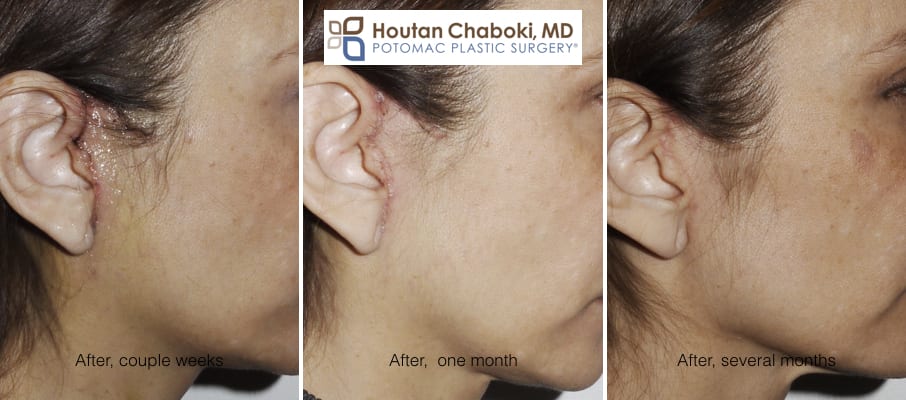
Before and after mini facelift healing process. Bruising and swelling may resolve more quickly by following your plastic surgery care instructions. Scars with cosmetic surgery gradually fade from view with time.
Plastic surgery patients want to have their procedure and return to work and life quickly. Even non-surgical liquid lift patients may have some recovery. Fortunately, the recovery after plastic surgery can be sped up in certain cases. Cosmetic surgery patients may proactively help heal faster via a variety of natural methods. Be sure, however, to follow the care instructions of your plastic surgeon specific to your individual procedure.
Stop smoking
You’ve heard it over and over that smoking is terrible, but it’s especially terrible with plastic surgery. Smoking increases many risks, including infections and scarring. Some plastic surgeons will not perform surgery for those who continue to smoke. In fact, there is evidence that a trip to the plastic surgeons office is a good method to quit smoking. This restriction also includes any product that has nicotine.
Be sure to strictly avoid smoking both before and after surgery, especially with procedures that involve a “lift” (ex. facelift or tummy tuck) or any rhinoplasty procedures.
Gentle activity
Some rest is important in the initial recovery period. Exercise and heavy lifting is avoided for the first couple of weeks, but it’s important to move somewhat after surgery and not stay in bed. Light walking and stretching may improve recovery, boost your immune system, and help limit risk of blood clots. To help you get back on your feet quicker, plastic surgeons may use longer acting local anesthesia, which can help reduce postoperative discomfort.
Watch your Diet
Essentially, anything that is generally good for your health is also good for your skin and helps reduce swelling after surgery and improve recovery:
- Focus on eating fresh fruits & vegetables
- Maintain hydration by drinking plenty of fluids, such as water and juices
Despite the fact that many plastic surgery patients already have a healthy diet, some items should be avoided before and after surgery to maximize healing. These include foods that may increase risk of bleeding and swelling:
- excess salt
- processed foods or fast foods
- spicy foods
- most herbal teas and supplements
Oxygen
Hyperbaric oxygen (higher than normal levels of oxygen) is used to promote wound healing. These oxygen treatments are usually reserved for patients at risk for healing issues after reconstructive plastic surgery. Plastic surgeons typically don’t have hyperberic oxygen in their offices, but rather may work with wound care centers that have hyperbaric oxygen chambers.
Laser Light
Unless you’re getting Botox® or cheek injections with filler, plastic surgery usually involves a scar in the area that is being lifted. These skin scars initially may appear red, as a normal part of the healing process, and fade with time. Some physicians may recommend laser treatment to help reduce redness and inflammation along the incision.
For more information, be sure to review the following in our blog to promote faster healing after plastic surgery:
- Natural methods to reduce swelling after plastic surgery
- How to Reduce Swelling after Lip Injections and Botox®
What other tips or methods do you have for a faster recovery after plastic surgery? Share your thoughts below. Contact the office for a consultation.

Thanks for pointing out how light walking and stretching will help you recover faster from a plastic surgery. My aunt is considering plastic surgery to enhance her looks, but she does not want to take a lot of time off from work, so I will be sure to share this tip with her so that she will be aware that there are ways to speed up her recovery.
Thank you for reading the blog. We like to see patients return to routine daily activity as soon as appropriate. As always, patients should keep in communication to ensure a smooth, uneventful recovery after plastic surgery whether it’s eyelid surgery or a facelift.
Best,
Dr. Chaboki